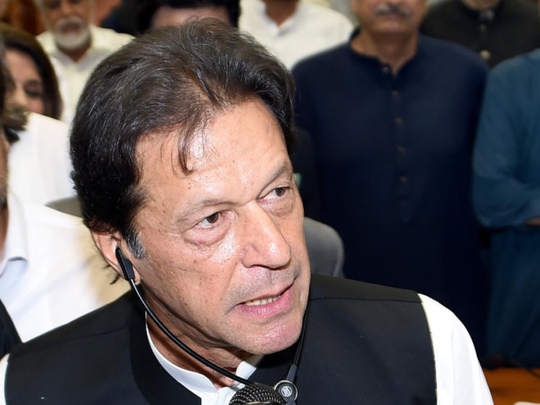
Thank God for the glorious weather in Islamabad at the moment. For everything else seems shrouded in bleak despondency, especially the economy.
There has been a sharp hike in fuel, electricity and gas prices, not to mention the rising cost of food. The Pakistan Tehrik-e-Insaaf (PTI) government has already issued several warnings of tough times ahead, blaming the past government for mismanagement of the economy and spiralling debt. As is the wont of all incoming governments, the previous office holders are the pall bearers of the gigantic burden of woes that comes with assuming power. For the poisoned chalice is at once alluring and toxic. And so, the story goes.
The International Monetary Fund has been approached yet again, despite vehement vows by PTI chairman and Prime Minister Imran Khan in the recent past to shun the international lending body if he came to power. There is, as bluntly put by the premier, no money to run the country. He has asked for patience to allow the PTI to chalk a way out of the financial crisis and rid the country of the need to ever extend the begging bowl. But it’s not just the financial crisis, there are innumerable other issues rearing their ugly heads. The energy crisis, the water crisis, which is indeed alarming, and of course the governance crisis. And a lot of blame game and complaints.
According to the prime minister, the country’s powerful bureaucracy is not cooperating with the government. The reason given is the bureaucrats’ allegiance to the previous government for having been given plum posts. But this is all part and parcel of the political system and it is something the PTI should have been prepared for. By harking on about all the failings and blockades it faces, the government has only managed to affect its own credibility. There is only a sense of steady deterioration of confidence in the government’s ability to steer the country out of the current mess. And with no clear-cut road map for the next five years, the bull in the china shop is not one to be appeased by anything less than a clear way out.
Finance Minister Asad Umer’s ongoing floundering and consequent attempts at reassurance that this is the last call on the IMF’s door have added to the confusion. Pakistan at this point is seeking one of the largest bailout packages, which is yet to be finalised. For one, the China Pakistan Economic Corridor (CPEC) is under scrutiny by the IMF, that wants details of all the debts, especially Chinese, that have been incurred by Pakistan. With the United States also flexing its muscles on the decision of the IMF package being sought by Pakistan, Umer will have to devise a strategic plan to balance a) Pakistan’s imperative needs in line with its national interests; b) the commitments to China for CPEC projects falling under the China Belt and Road Initiative and c) the anticipated tough conditions Pakistan is to face from the IMF.
Similarly, Pakistan’s trade imbalance is a gaping monstrosity and needs to be addressed on an urgent basis. Other grandiose plans promising millions of homes for the poor sound great, but if studied, lack any concrete footing except verbal commitments to provide a feasible environment for attracting investors to work on this scheme. Foreign investment is very welcome at this point as are the remittances and trust of overseas Pakistanis willing to invest in government-led projects. But there is much that needs to be done to ensure that this goes through. Foremost of these is confidence-building and certainty. The government is lacking both at this point.
Thus, despite the ubiquitous attempts of the PTI government at blaming its policies on the failures of the previous government, it should be cognisant of the detrimental impact of continuing to do so. It had been quick to raise a hue and cry over everything under the previous government and waxed lyrical about what changes it would bring to fix the economy. But where are those plans now? The PTI government should have been well-prepared before stepping on the quicksand they call government, but the only thing evident is sinking confusion. It would be wise to remember that people can only tolerate for so long and allow so much. And it is expected to get worse.
Painful inflation, electricity and gas outages and exorbitant energy prices are likely to bite harder with the seasonal change. And while the trees don their mantle of gold and rust and autumn slips into winter, the nights ahead would be cold and dark. It is crucial to inspire and instil confidence. Procrastination would only hasten the worst.
Faryal Leghari is a former Deputy Opinion Editor of Gulf News.









